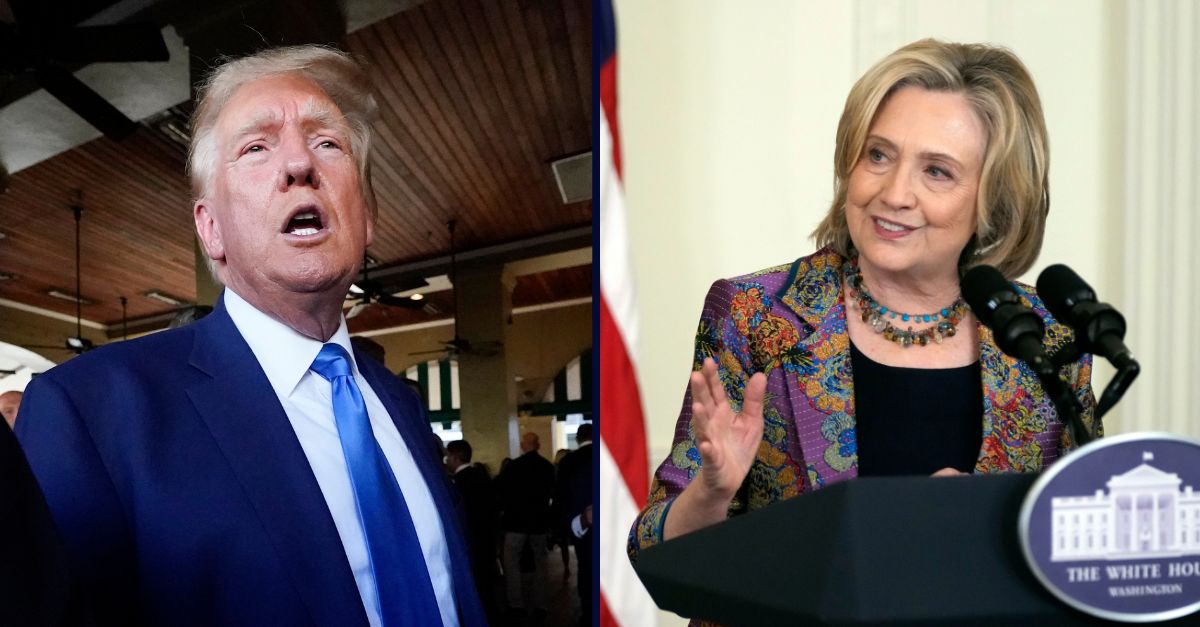
Left: FILE – Former President Donald Trump visits Café du Monde in New Orleans, July 25, 2023. Republicans are responding to a late summer spike in COVID-19 by raising familiar fears that government-issued lockdowns and mask mandates are on the horizon. GOP presidential hopefuls, including Florida Gov. Ron DeSantis, South Carolina Sen. Tim Scott and former President Donald Trump, have spread this narrative. (AP Photo/Gerald Herbert, File). Right: Former Secretary of State Hillary Clinton speaks during an event with first lady Jill Biden to celebrate the 2023 Praemium Imperiale Laureates, a global arts prize awarded annually by the Japan Art Association for lifetime achievement in the arts, in the East Room of the White House, Tuesday, Sept. 12, 2023, in Washington. (AP Photo/Alex Brandon)
The federal judge who dismissed Donald Trump’s RICO case against Hillary Clinton more than a year ago has once again declined to indulge the former president’s demand that the judge remove himself from the matter as the case is appealed.
U.S. District Judge Donald M. Middlebrooks fielded a second motion from Trump that the judge — a Bill Clinton appointee — recuse himself in August of this year. Middlebrooks previously denied a similar motion from the former president in April 2022.
“I have never met or spoken with Bill or Hillary Clinton,” Middlebrooks wrote in that April 2022 ruling. “Other than my appointment by Bill Clinton, I do not now have nor have I ever had any relationship with the Clintons.”
In his latest denial, Middlebrooks says he doesn’t believe he has jurisdiction to consider the motion because when Trump appealed the dismissal, the Eleventh U.S. Circuit Court of Appeals took over.
“Upon the filing of an appeal, the District Court is divested of jurisdiction over the matter,” the judge wrote (citations omitted). “‘The filing of a notice of appeal is an event of jurisdictional significance — it confers jurisdiction on the court of appeals and divest the district court of its control over those aspects of the case involved in the appeal.””
Middlebrooks noted that Trump’s legal maneuvers prevent him from asserting jurisdiction.
“Plaintiff’s Notice of Appeal on February 6, 2023, divested this court of its jurisdiction over the case,” he wrote. Although court rules allow Middlebrooks to retain jurisdiction over some matters — and Trump’s lawyers did file timely motions on the issue of the report from special counsel John Durham — that didn’t happen on the matter of recusal.
“He did not, however, file a motion to stay the appeal for a motion to disqualify,” the judge wrote. “Further, fourteen days have passed since he filed the motion to disqualify, and he has not filed a motion in the Eleventh Circuit to stay the appeal to allow me to rule on it. As a result of Plaintiff’s partial adherence with these rules, the Eleventh Circuit only stayed the appeal ‘pending Appellant seeking an indicative ruling below.’”
Read Related Also: Clarence Thomas Secretly Participated in Koch Network Donor Events
But even if Middlebrooks did believe he had jurisdiction over Trump’s disqualification request, he would deny it.
“I would not grant the motion and do not believe it raises a substantial issue,” the judge writes, noting Trump’s criticisms of the judge’s order of sanctions against team Trump.
“Movants complain that I ‘went above and beyond’ the defendants’ arguments and conducted ‘extrajudicial research,’” Middlebrooks writes. “This seems to be a pejorative misnomer. In my two orders on sanctions, I conducted limited independent judicial research in every instance in response to arguments made by the parties. I looked at judicial decisions, legal filings, and statements not subject to dispute and directly made by Mr. Trump and his lawyers. In each instance, I cited the source for the information.”
Defending his prior findings, Middlebrooks reiterated his conclusion that Trump’s case against Clinton is baseless.
“The case before me was frivolous, its purpose was improper and part of a pattern of behavior harmful to the Rule of Law,” he writes. “Article III judges have an obligation to protect the administration of justice from abuse.”
Read the ruling below.
Have a tip we should know? [email protected]








